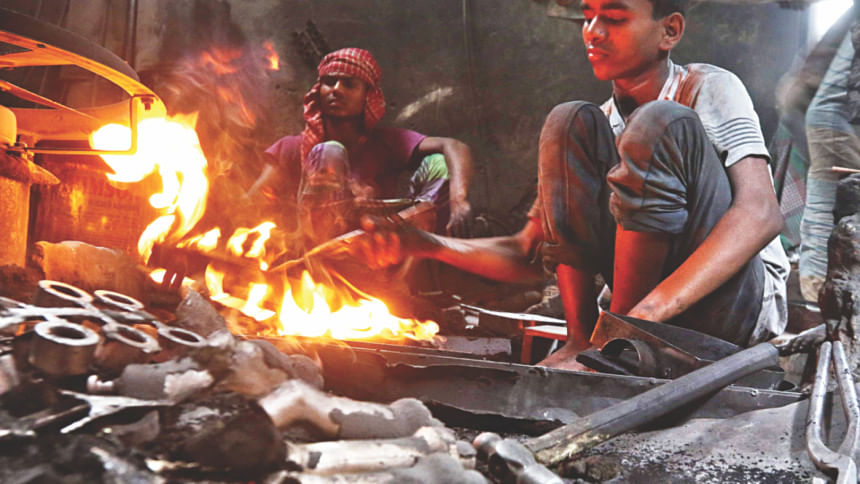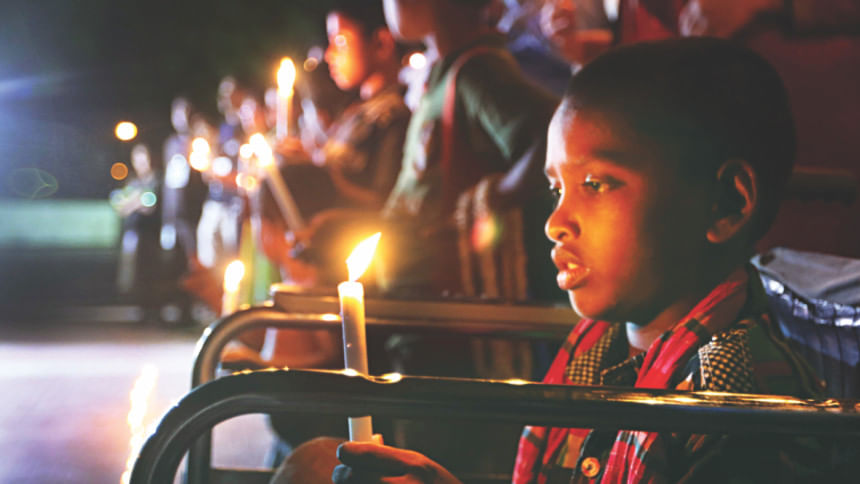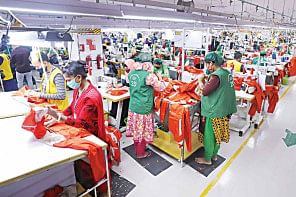‘Nobody cares about them'

Except for a handful few, most of the country's workers do not enjoy the rights as per the labour law. Even those who are claimed to be covered by the law see only partial implementation of their rights, according to labour rights experts.
There are 5.76 crore workers in Bangladesh as per the latest official statistics. Hardly 20 percent of them enjoy privileges stipulated in the law, said Syed Sultan Uddin Ahmmed, assistant executive director of Bangladesh Institute of Labour Studies.
"The rights of even the workers covered by the law are not fully implemented," he told The Daily Star yesterday.
"Most workers still toil more than 12 hours a day. They don't have identity cards. They don't get fair wages, pension and housing and health benefits. Nobody cares about them, unless there is an international pressure," he observed.
Against this backdrop, Bangladesh observes the International Workers' Day, also known as May Day, today through different programmes organised by the government, labour rights organisations and workers' platforms. The day is a government holiday.
"But workers' rights are still less respected in Bangladesh than in the US in 1886," said Syed Sultan, referring to the 1886 Haymarket Massacre in Chicago which acted as a watershed event in improving rights of the workers across the world, including the achievement of an eight-hour working day.
Like last year, the May Day in Bangladesh this year comes just a week after the anniversary of the tragic Rana Plaza collapse that killed at least 1,135 workers and injured about 2,000 on April 24, 2013.

The heart-wrenching incident is a glaring example of failures of all stakeholders in ensuring workers' safety. The government agencies did not enforce building laws, factory owners did not pay heed to safety concerns and international buyers did not bother much about the working conditions in the factories manufacturing products for them.
The country has progressed a lot in improving workplace safety since the collapse, as the government and private sector entrepreneurs have taken a lot of positive initiatives, according to the International Labour Organisation.
But two days before the second anniversary of Rana Plaza collapse, US-based Human Rights Watch said while changes to some labour laws since the incident, including provisions easing the union registration process, have facilitated registration of new unions, still fewer than 10 percent of garment factories in Bangladesh have unions.
At Rana Plaza, factory managers compelled reluctant workers to enter the building despite major cracks in the complex's walls. At the Tazreen factory, where a fire killed at least 112 workers on November 24, 2012, managers refused to let workers escape even after the fire alarms went off. None of the factories involved had a union to represent workers to help them to push back against the managers' deadly demands, said the HRW.
In the Rana Plaza case, the families of the deceased and the survivors have yet to be fully compensated. Moreover, justice to the victims remains elusive as police have not yet submitted charge sheets against the government officials culpable for the tragedy.
The Criminal Investigation Department (CID) of police completed its investigation in two criminal cases, filed along with nine more following the incident, about six months ago. It found four officials of the labour ministry and two of the public administration ministry along with 38 others responsible for the incident, CID sources said.
However, the CID could not submit the charge sheets as it did not get the approval from the labour and the public administration ministries to press charges against their officials.
About the refusal to give the permission, Labour Secretary Mikail Shipar said the four officials in question had not violated any provision of the labour law that existed back then.
The law did not permit the ministry officials to inspect mills and factories, he said.
It was only through an amendment to the labour law in 2013 that the officials were given the authority to inspect mills and factories, Mikail said.
However, Israfil Alam, chairman of the parliamentary standing committee on the labour ministry, said he was sceptical that the victims would get their due justice as the people whose negligence led to the collapse were very powerful.
"There are loopholes in the legal system," the ruling party lawmaker said at a programme in the capital's Brac Inn last month.

 For all latest news, follow The Daily Star's Google News channel.
For all latest news, follow The Daily Star's Google News channel. 



Comments